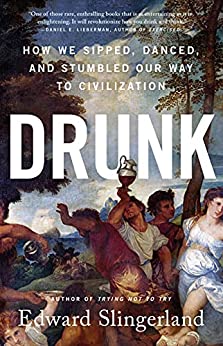More on this book
Community
Kindle Notes & Highlights
Read between
May 23 - June 6, 2024
My central argument is that getting drunk, high, or otherwise cognitively altered must have, over evolutionary time, helped individuals to survive and flourish, and cultures to endure and expand.
There are very good evolutionary reasons why we get drunk.10 What this means is that most of what we think we know about intoxication is wrong, incoherent, incomplete, or all of the above.
We could not have civilization without intoxication.
Beyond our vague cultural queasiness about celebrating pleasure for pleasure’s sake, defending the benefits of alcohol risks provoking a strong backlash from those who rightly worry about the profound costs of intoxicant use.
“truth is revealed by wine and children”—a
In ancient Greece, oaths declared under the influence of wine were viewed as particularly sacred, reliable, and powerful.
The take-home lesson is: Keep your eye on the guy who is skipping the toasts.
A common cross-cultural pattern is that drinking is more associated with men than women.
This is why strangers are typically welcomed with copious quantities of booze. Successfully making it through a night of heavy drinking is perhaps the quickest way to become accepted in a novel social environment.
The ability to hold one’s alcohol is a sign of more general reliability or even moral virtue.
adults (at least adult males) get drunk together with an expectation that this would be an opportunity for them to display self-restraint and virtue under challenging conditions.
If participating in communal drinking sessions impairs your ability to lie, increases your sense of connectedness to others, and provides a test of your underlying character, it is then understandable why non-drinkers tend to be viewed with suspicion. “Water drinker” was used as a term of abuse in ancient Greece.
Men who display kanikani, an unpleasant skin condition resulting from excessive kava consumption, are viewed with respect and seen as true “men of the village,”
This means that, despite the trouble he inevitably brings in his wake, we still need Dionysus to play a role in our lives.
As we discussed earlier, there is a solid body of evidence that mind wandering and creativity go hand in hand, so enhancing the first should boost the second.
worldwide, humans spend approximately 4 trillion dollars per year (2016 U.S. dollars) solely in the pursuit of “getting out of [their] heads.”


